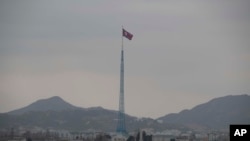The United States is calling on China to do more to monitor North Korean sanctions violations as a U.N. panel charged with that task is set to expire this month.
"Beijing can do more to combat the DPRK's sanctions evasion efforts in PRC territorial waters, repatriate North Korean laborers earning income in PRC territory, and shut down procurement networks," a State Department spokesperson said in an email Wednesday to VOA's Korean Service.
DPRK refers to the Democratic People's Republic of Korea, North Korea's official name. China's official name is the People's Republic of China.
The U.S. official also reacted to comments this week by Liu Pengyu, a spokesperson for the Chinese Embassy in Washington, who told VOA, "The U.S. needs to ... stop heightening the pressure and sanctions, stop military deterrence, and take effective steps to resume meaningful dialogue."
Washington has been sending messages to Pyongyang seeking a dialogue "in multiple ways – through third parties and directly, orally and in writing," said the U.S. spokesperson, who insisted on anonymity according to department policy. But North Korea has shown "no indication it is interested in engaging," he wrote.
Liu, whose remarks were delivered to VOA by email on Monday, also maintained that "China has faithfully implemented relevant U.N. Security Council resolutions."
DPRK 'grows stronger'
The North Korean Foreign Ministry's vice minister for U.S. affairs, Kim Un Chol, released a statement through its state-run KCNA on Thursday saying Washington's attempt "to enliven the worn-out sanctions and pressure the DPRK" would be met with a military response.
"If the U.S. introduces a new version of sanctions against the DPRK, the latter will take a new opportunity necessary for its upward readjustment of force which the U.S. is most afraid of," said Kim. "The DPRK is a state entity that grows stronger before harsher sanctions and pressure."
Linda Thomas-Greenfield, the U.S. ambassador to the United Nations, visited South Korea and Japan last week to discuss new ways of enforcing sanctions on North Korea.
Authorization of the U.N. panel of experts that has been monitoring sanctions enforcement expires at the end of this month because Russia vetoed a U.N. Security Council resolution calling for an annual extension of its mandate. China abstained.
Thomas-Greenfield said at an April 17 news conference in Seoul that it was "critical" for all U.N. member states to continue "receiving independent and accurate reporting of the DPRK's ongoing weapons proliferation and sanction evasion activities."
She also said, "We will eventually find a mechanism to continue to do that reporting. And yes, Russia and China will continue to try to block those efforts."
She added, "I don't expect that they will cooperate or agree with any efforts that we make to find another path, but that is not going to stop us from finding that path moving forward."
Aaron Arnold, former member of the U.N. panel of experts and currently a senior associate fellow at the London-based Royal United Services Institute, said he believed it is possible to create an external monitoring body without Russia and China.
"Although the report [of a new body] may not hold the same political legitimacy as a report produced under a [U.N.] mandate, relevant stakeholders such as banks will certainly make use of them," Arnold said.
The U.N. panel produced reports twice a year detailing the violations of sanctions by U.N. member states, including China and Russia.
"Everyone who reads the reports of the U.N. panel of experts knows the truth" that China is violating sanctions, said Joshua Stanton, a Washington-based attorney who helped draft the Sanctions and Policy Enforcement Act in 2016.
"It has been illegally importing North Korean coal, knowingly hosting North Korean hackers, helping North Korea disguise its smuggling fleet, and hosting North Korea's money laundering and computer hacking networks," he said.
"North Korean missiles even parade through the streets of Pyongyang on Chinese trucks."
China is harboring at its port in its eastern Zhejiang province a U.S.-sanctioned Russian cargo ship, the Angara, that transported arms from North Korea, Reuters reported Thursday, citing the Royal United Services Institute's findings.
Eunjung Cho contributed to this report.




